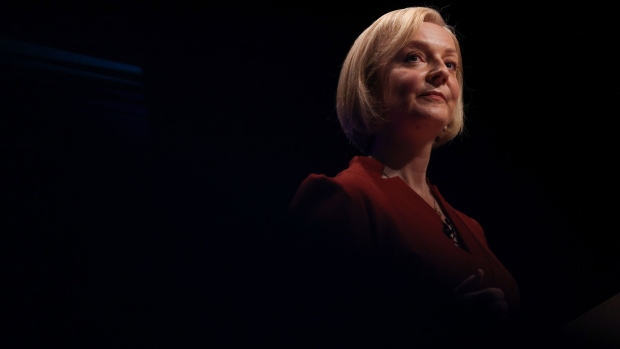Oct 22, 2022
Liz Truss’s 44 Days in Office Net Her a £115,000 Yearly Stipend for Life
, Bloomberg News

(Bloomberg) --
Despite her short tenure as Prime Minister, Liz Truss is eligible to claim a £115,000 ($129,306) per year allowance for the rest of her life.
Truss’s 44-day tenure qualifies her for the Public Duty Costs Allowance. The money isn’t for private use, rather to help pay for the additional costs faced by former-prime ministers from being in “public life,” like staffing.
The idea of the shortest-serving prime minister ever receiving the payments has been controversial, with some pointing out that the money could be put to better use. Truss didn’t immediately respond to a request for comment. Here’s what you need to know.
What is the Public Duties Costs Allowance?
The allowance was announced by then-Prime Minister John Major in 1991 following the resignation of his predecessor, Margaret Thatcher.
Payments are made by the central Cabinet Office to reimburse past leaders for office expenses incurred due to the “special position in public life.” They are not allowed to spend the money on their private lives or to pay for their constituency office.
The £115,000 limit is reviewed by the sitting prime minister at least once a year, but it has been static since 2011.
What are the restrictions on it?
All former prime ministers are eligible to take the payments, as long as they don’t go on to lead the official opposition in Parliament. There’s a separate salary for that. If they take on another public sector job, the Cabinet Office will review — and possibly reduce — the amount they receive.
Former leaders cannot request payment “in advance of need.” To show how they’re using the money, they must hold onto documents like receipts or pay slips and make them “available on request” to the Cabinet Office.
Former leaders are able to claim the allowance for the rest of their lives — and even beyond. Staff salaries are paid for three months after the death of a former prime minister. The costs of closing down the office will also be paid for.
Which former prime ministers claim the most?
The Cabinet Office publishes the amount paid out to former prime ministers each year. Here’s a breakdown for the year ended March 31, 2021:
- Sir John Major and his successor, Tony Blair, both claimed the maximum £115,000 allowance.
- Gordon Brown and David Cameron both claimed close to the limit, receiving £114,712 and £113,423 respectively.
- Theresa May claimed the least, receiving £57,832.
Including pension costs for their staffs, taxpayers spent a total of £571,348 on the payments last year. Boris Johnson would also be eligible to claim payment, but any request he may have made isn’t yet public.
Controversy surrounding the payments
Many on social media were quick to say Truss should turn down the payments, given her short time as leader. Some, especially in the opposing party, pointed out that the annual amount is more than she earned in salary during her month and a half as prime minister, while others questioned how the money could be better used.
The Liberal Democrats said there “is no way that she should be permitted to access the same £115k a year for life fund as her recent predecessors — all of whom served for well over two years.”
©2022 Bloomberg L.P.






